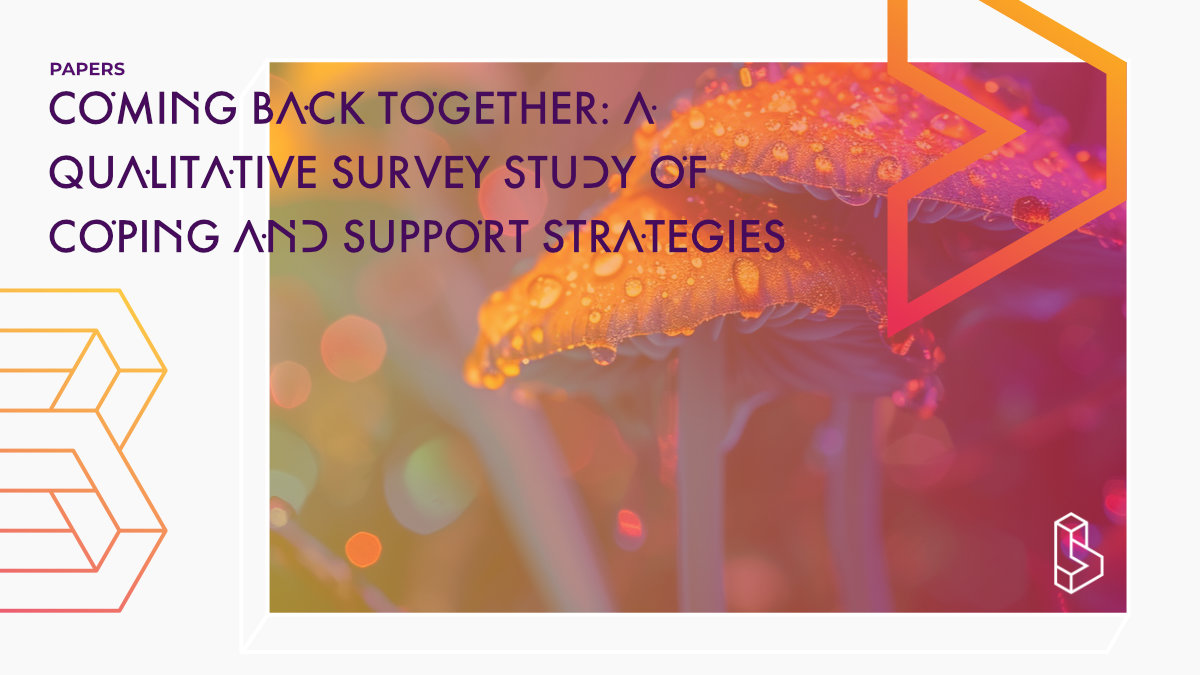This qualitative study (n=608) investigated coping strategies employed by individuals experiencing difficulties persisting for at least one day after a psychedelic experience. Predominant individual coping strategies included meditation and prayer, along with self-educational activities like reading and journaling. Social coping methods were commonly seeking support from friends or family, and obtaining assistance from a therapist or coach, with reported benefits including feeling heard, accepted, and sharing similar experiences.
Abstract of Coming back together: A qualitative survey study of coping and support strategies used by people to cope with extended difficulties after the use of psychedelic drugs
“A growing body of literature is focused on understanding the extended difficulties individuals encounter after psychedelic experiences. Although existing research has explored the nature and predictors of these difficulties, a significant research gap exists in the exploration of coping strategies adopted by individuals in response. This study collected data from a diverse international cohort of 608 participants who had experienced difficulties that persisted for at least one day after a psychedelic experience. They provided written data on how they coped with these difficulties. The qualitative analysis of the written data on coping was conducted using Structured Tabular Thematic Analysis. It revealed a wide range of coping strategies employed at both individual and social levels. Predominant among individual strategies were meditation and prayer, followed by self-educational activities such as reading and journaling. The most prevalent forms of social coping involved seeking support from friends or family members, followed by obtaining assistance from a therapist or coach. Particular features of social coping were reported to be helpful such as feeling heard, feeling accepted and sharing similar experiences. These insights hold significant potential for designing therapeutic interventions and educational resources aimed at enhancing coping strategies for those experiencing extended difficulties after psychedelic use.”
Authors: Oliver Robinson, Jules Evans, David Luke, Rosalind McAlpine, Aneta Sahely, Amy Fisher, Stian Sundeman, Eirini Ketzitzidou-Argyri, Ashleigh Murphy-Beiner, Katrina Michelle & Ed Prideaux
Summary of Coming back together: A qualitative survey study of coping and support strategies used by people to cope with extended difficulties after the use of psychedelic drugs
Introduction
A diverse international cohort of 608 participants who had experienced difficulties that persisted for at least one day after a psychedelic experience provided written data on how they coped with these difficulties. The most prevalent forms of coping were meditation and prayer, followed by self-educational activities such as reading and journaling.
Psychedelics are substances that induce a heightened or radically altered state of consciousness. They work by stimulating the serotonin 5HT 2A receptor. Psychedelics are becoming increasingly explored as psychiatric medicines, but there is a renewed interest in understanding their associated risks. Up to 7% of participants report adverse psychological experiences lasting longer than a day with the use of psilocybin and MDMA, including increased feelings of suicidality. Ayahuasca users are more likely to seek mental health assistance for adverse effects, and 39% of psychedelic users who encounter challenging experiences rate these as among the top five most difficult experiences of their lives. Evans et al. (2023) analysed brief narratives gathered from a large international cohort, and found that participants experienced 60 different types of extended difficulties following psychedelic experiences, including general anxiety, social disconnection, derealization and depersonalization, perceptual distortions, and existential confusion.
Find this paper
Open Access | Google Scholar | Backup | 🕊
Cite this paper (APA)
Robinson, O., Evans, J., Luke, D., McAlpine, R., Sahely, A., Fisher, A., ... & Prideaux, E. (2024). Coming back together: A qualitative survey study of coping and support strategies used by people to cope with extended difficulties after the use of psychedelic drugs. Available at SSRN.
Study details
Topics studied
Safety
Study characteristics
Survey
Qualitative
Participants
608
Humans

